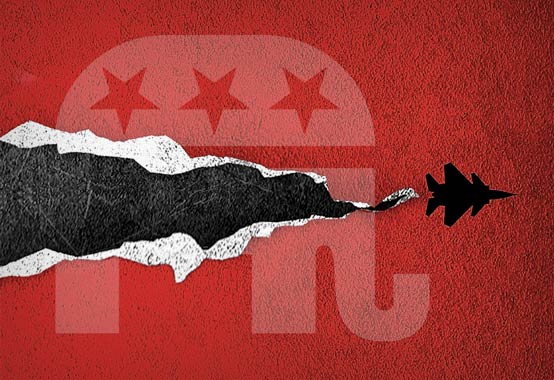The War on Antiwar Republicans

Walter Jones is the first target. The ten-term North Carolina Republican has emerged as a leading antiwar voice in Congress. As a result, he faces a primary challenge from former George W. Bush aide Taylor Griffin—and a barrage of hostile spending from outside groups.
The Emergency Committee for Israel has launched a six-figure ad campaign describing Jones as a convert to liberalism. “Once upon a time, Walter Jones was right for North Carolina but he’s changed,” says the narrator in the 30-second spot. “Isn’t it time your vote changed as well?”
A super PAC formed by TD Ameritrade founder Joe Ricketts is also spending $156,000 on ads attacking Jones as some kind of liberal. Ricketts’ Ending the Spending claims Jones, one of the last members of the GOP class of ’94 in Congress, has “lost his North Carolina values.”
Carter Wrenn, the longtime Tar Heel State conservative operative who with Jesse Helms and Tom Ellis helped revive Ronald Reagan’s 1976 presidential campaign, told Roll Call, “It’s going to be a tough sell to say Walter Jones doesn’t have North Carolina values, but if they have money it will be real.”
A tough sell, indeed. Jones is pro-life, pro-traditional marriage, pro-gun, and has compiled one of the most reliable socially conservative records in Congress. He voted to repeal and defund Obamacare. He’s also voted against many big-ticket spending items supported by most Republicans, including Bush’s deficit-financed Medicare prescription-drug benefit, No Child Left Behind, and last year’s farm bill.
The real issue is Jones’s willingness to stand against his party on foreign policy. A man from a military-heavy district with patriotic instincts, he initially supported the Iraq war and famously led the “freedom fries” campaign. He came to doubt the intelligence used to justify the war and turned sharply against it—and most of the subsequent military interventions pushed by the bipartisan establishment.
Next on the list is Justin Amash, whose primary comes nearly three months later in August. “Over cocktails and chocolate-covered strawberries,” Newsmax reports, a group of west Michigan Republicans gathered at a Tudor-style home in Grand Rapids,” eventually settling on businessman Brian Ellis to challenge Amash.
Foreign policy is far from the only reason the establishment is gunning for Amash. Hailing from a district once represented by Gerald Ford, some dislike the young two-term incumbent’s strict interpretations of the Constitution and his confrontational style. Ellis has actually shied away from criticizing Amash’s bipartisan efforts to rein in national surveillance, preferring to focus instead on Congressional gridlock.
But Ellis was quick to pounce on Amash’s “bizarre” vote against tightening Iran sanctions. Amash has supported some carefully targeted sanctions against Iran. “Sanctions that are directed toward preventing them from getting weapons of mass destruction, I think those sanctions are useful and helpful in the short run. I’m not sure you’d want to use them for 20 years,” he told Reason. “But there are other sanctions that are targeted at the people of Iran. Those are not beneficial to the United States.”
The main event, however, is going after Rand Paul. Paul is unlikely to face a viable primary challenger for his Senate seat, but he is considered a top-tier candidate for the Republican presidential nomination. “Can he win Iowa, yes. Can he win New Hampshire, yes. Can he win the nomination, maybe—and that’s scary,” an unnamed Mitt Romney bundler fretted to Time.
The Time piece reports that casino billionaire Sheldon Adelson “is likely to spend vast sums against Paul if he appears to be well positioned in the Republican primaries.” Another donor is quoted as saying, “The best thing that could happen is Ted Cruz and Rand Paul run and steal each other’s support, but if not, we’ll be ready to take Paul down.”
With a Republican-controlled Senate in sight, why spend money on a purge of antiwar Republicans? Because the party’s most rabid hawks don’t want any competition in setting GOP foreign policy. Yet even with the number of non-interventionists, realists, and other skeptics still fairly small, they haven’t been able to primary everybody.
So far, efforts to recruit a serious primary challenger against Thomas Massie, a Paul ally and Republican congressman from Kentucky, have come up empty. Mark Sanford—who has quietly emerged as one of the most reliable libertarian-leaning Republicans in the House—is running unopposed in both the primary and the November general election.
Former Bush White House press secretary Ari Fleischer says of Paul, “there’s still a naiveté that’s going to be a problem. He represents a departure from something a lot of Republicans are used to.”
Hopefully a departure from losing wars and elections.
W. James Antle III is editor of the Daily Caller News Foundation and author of Devouring Freedom: Can Big Government Ever Be Stopped?
Comments